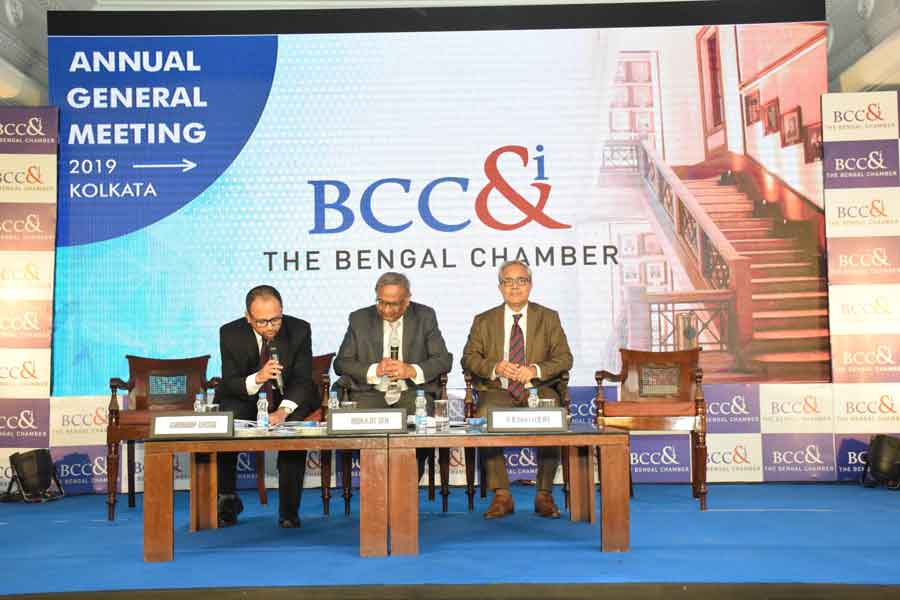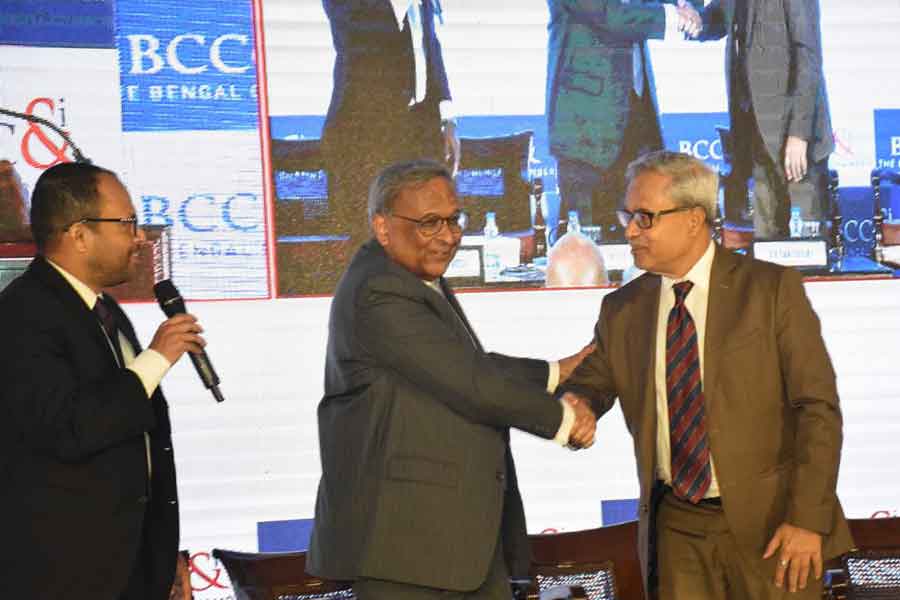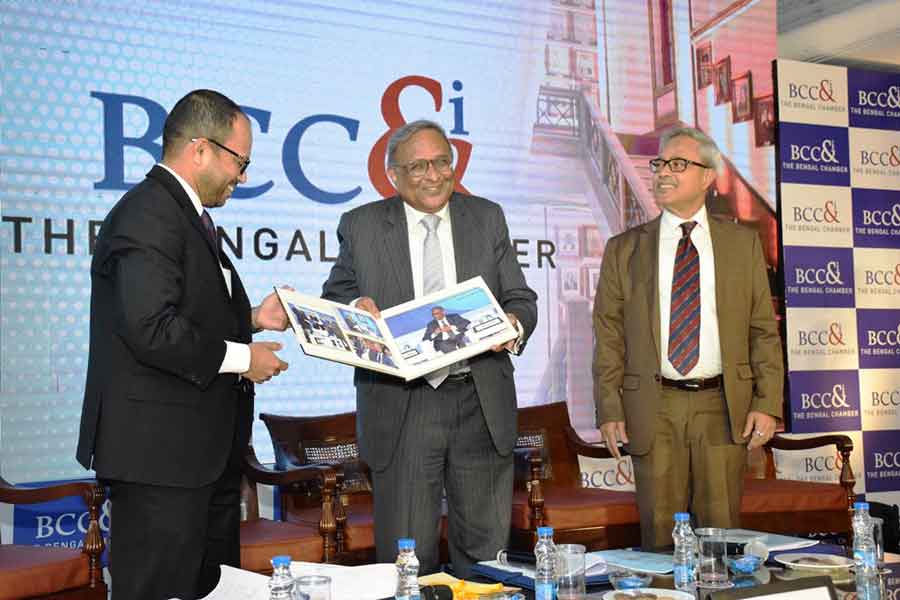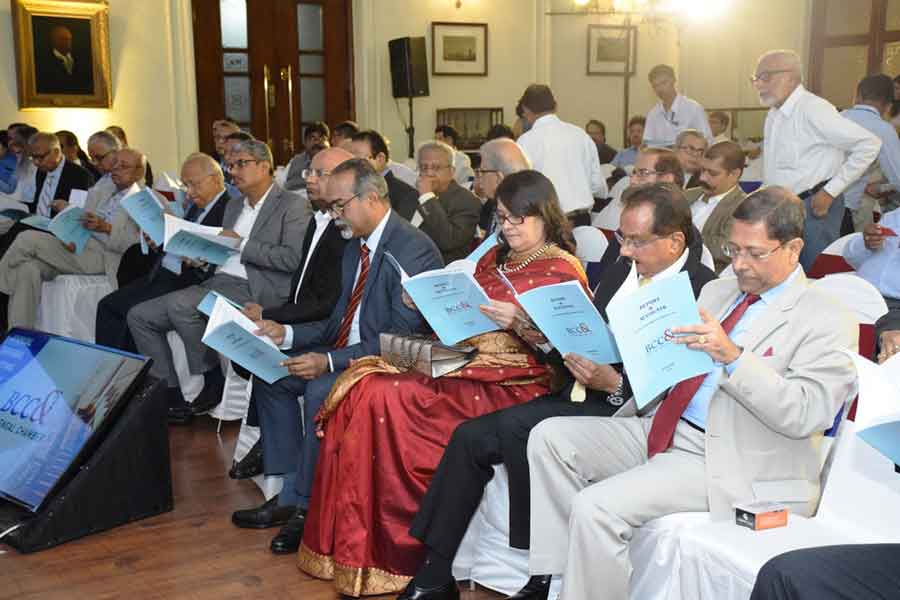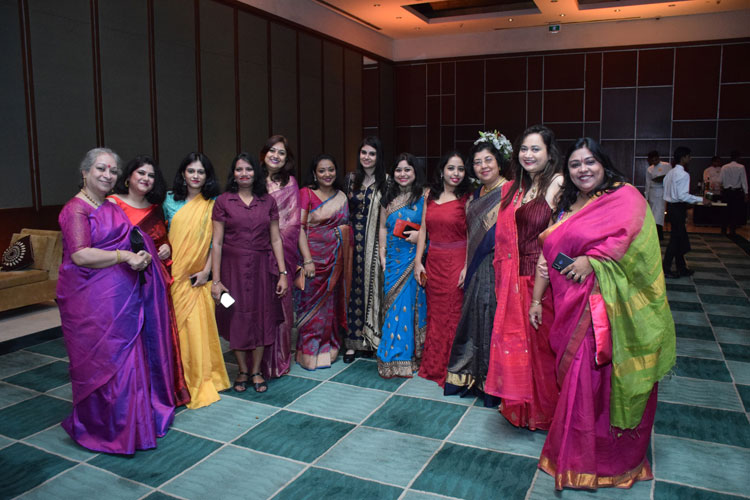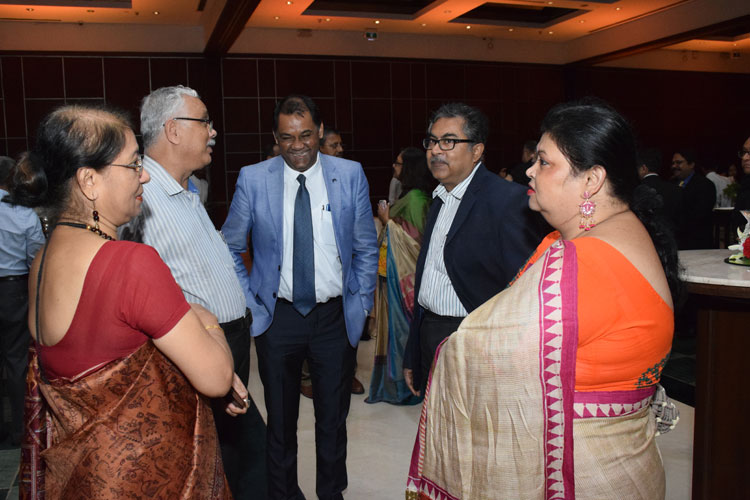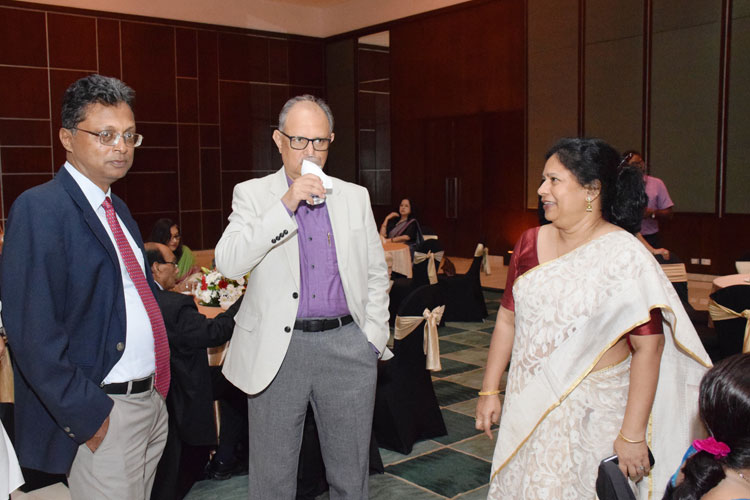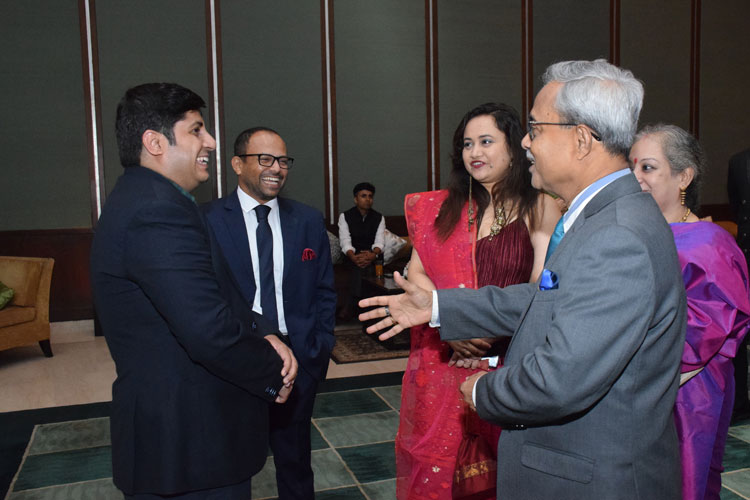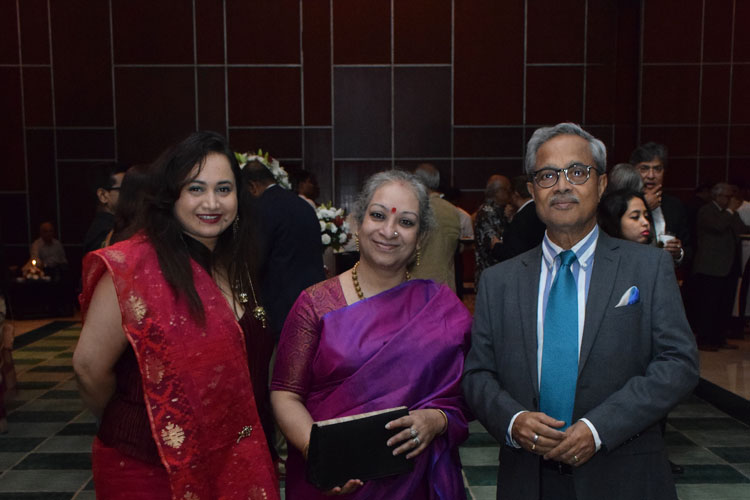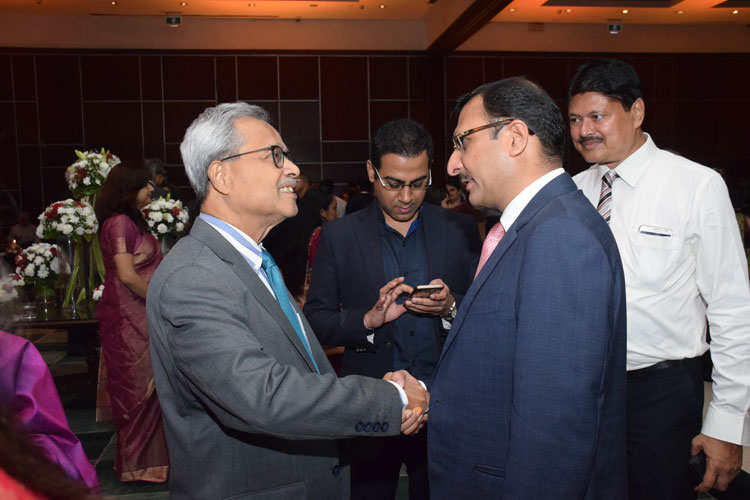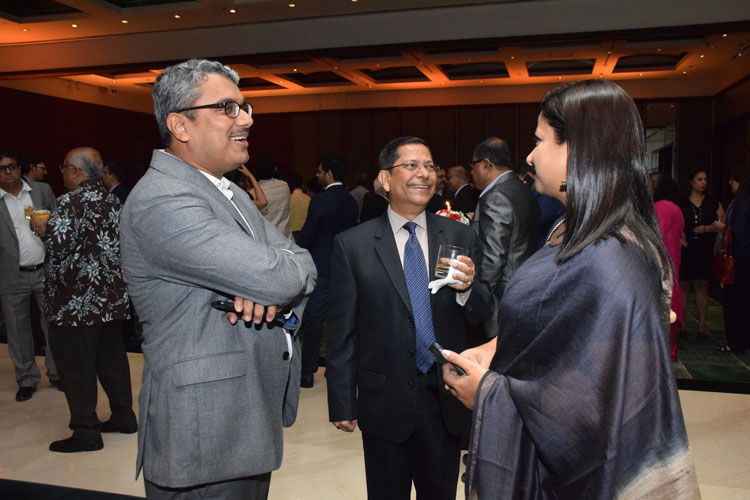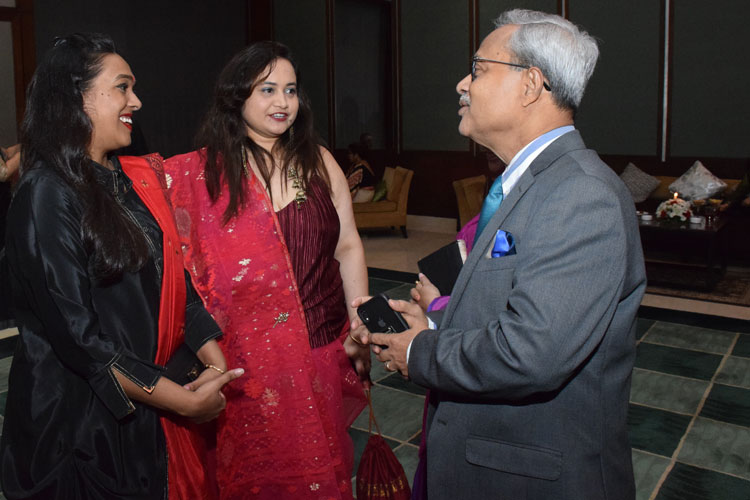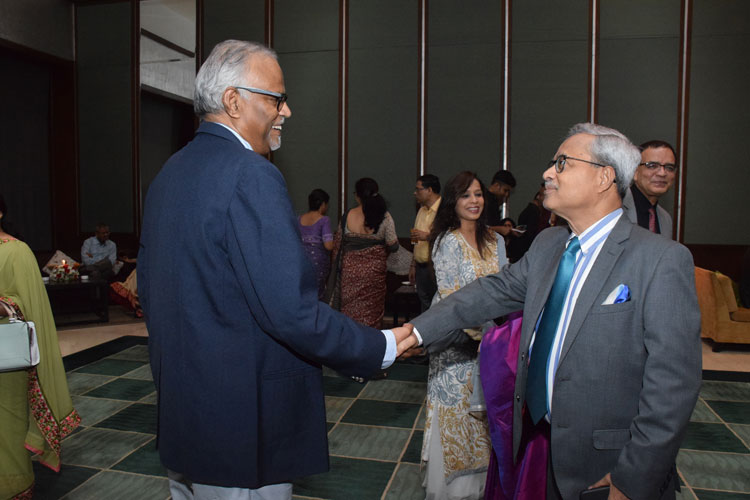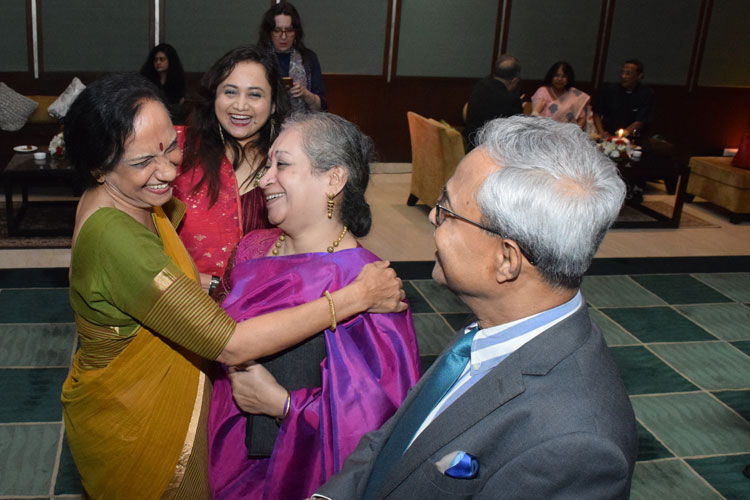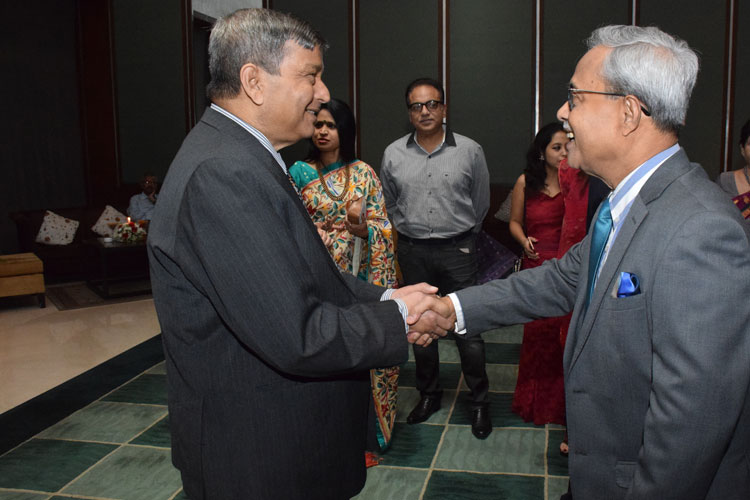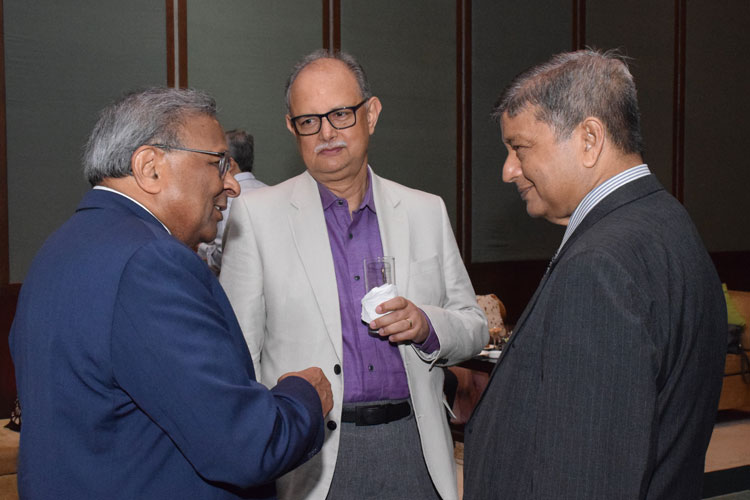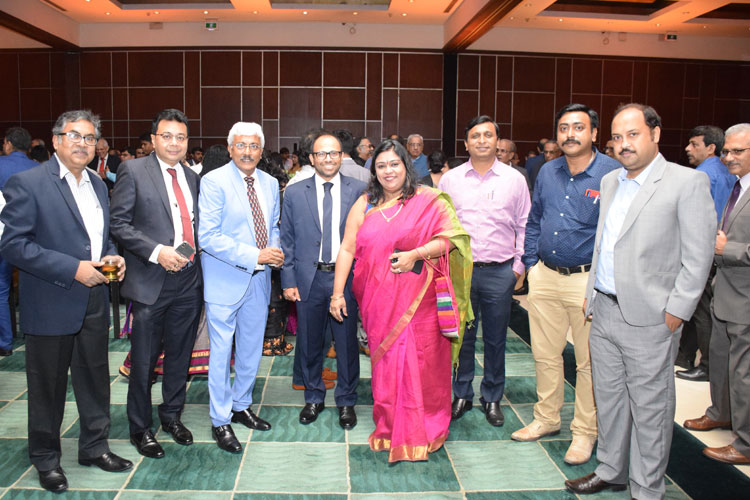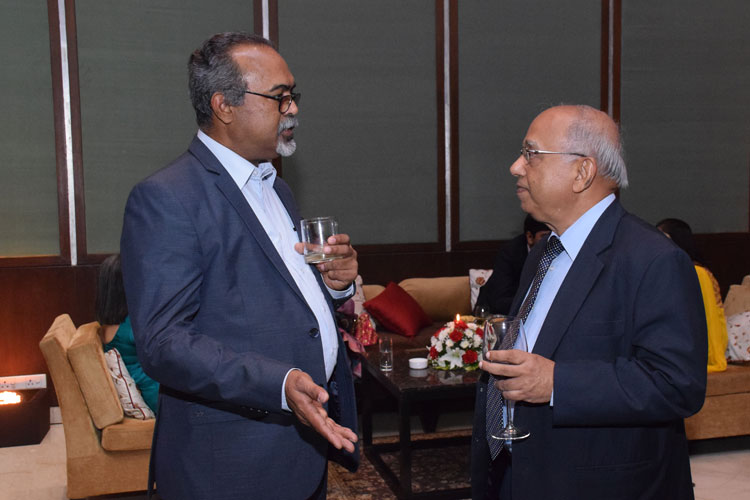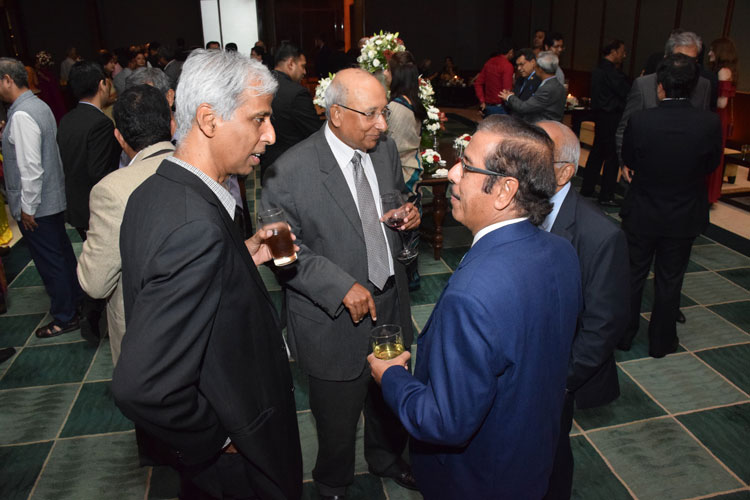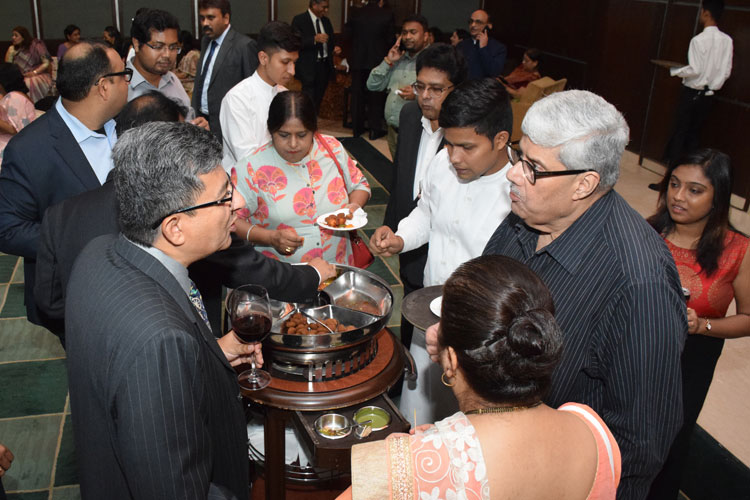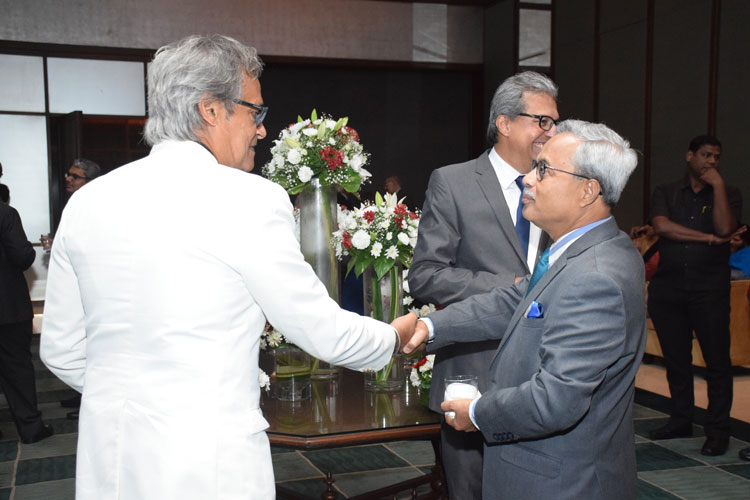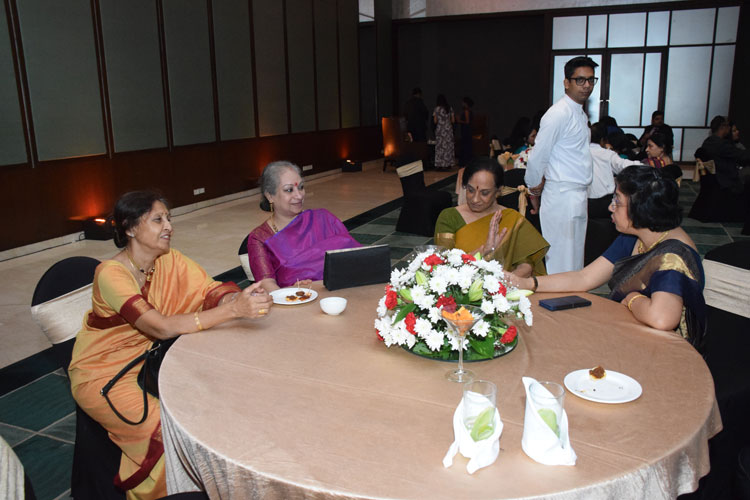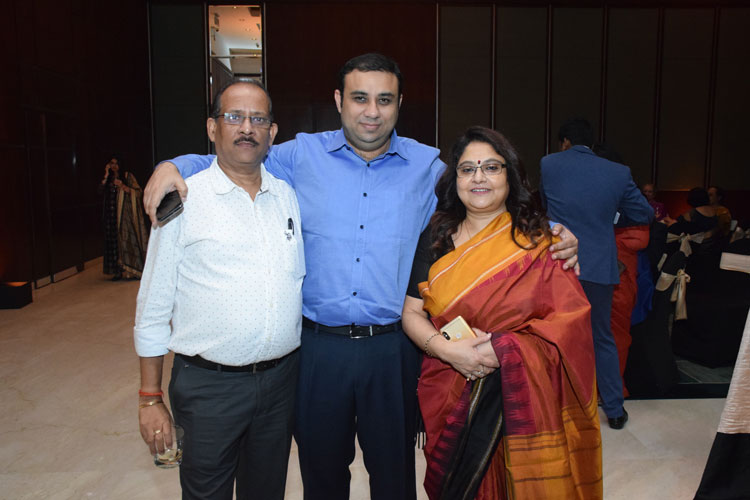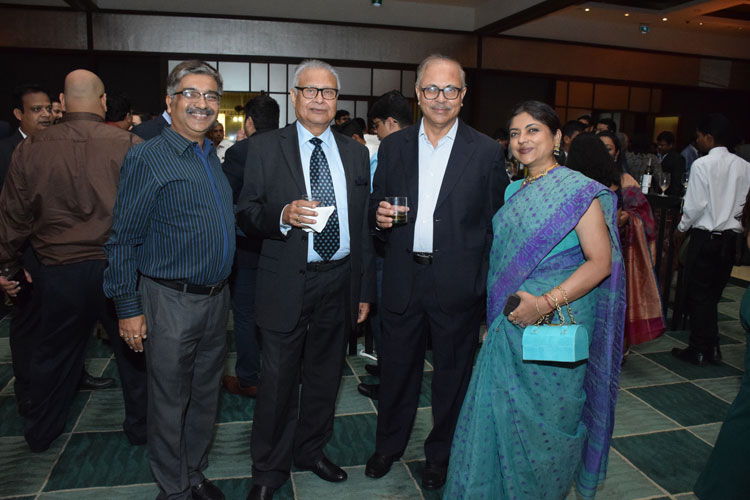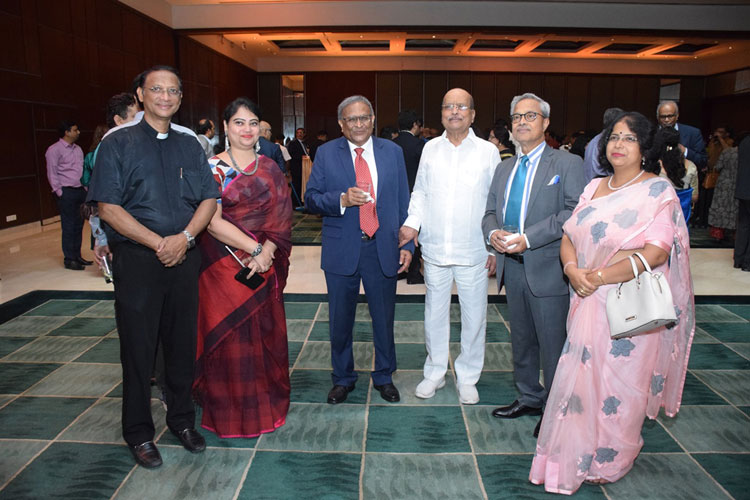The Bengal Chamber 165th Annual General Meeting 2019, 23rd September 2019, The Bengal Chamber Premises (Annual Reception in the Evening at the ITC Sonar)

L-R : Mr. Indrajit Sen, President, The Bengal Chamber of Commerce and Industry ; Dr. Amit Mitra, Hon'ble Minister-in-Charge, Finance; Industry, Commerce & Enterprises; MSME and Textiles, Government of West Bengal; Shri M. Damodaran, Former Chairman, Securities and Exchange Board of India (SEBI); Industrial Development Bank of India (IDBI); Unit Trust of India (UTI) and Former Chief Secretary, Government of Tripura; Mr. B B Chatterjee, President Designate, The Bengal Chamber of Commerce and Industry
Inaugural Session
The 165th Annual General Meeting (AGM) of The Bengal Chamber of Commerce and Industry was held on 23rd September 2019, at the Chamber premises.
The Inaugural Public Session of the AGM which started at 10:30 a.m., had Dr. Amit Mitra, Honourable Minister-in-Charge, Finance; Industry, Commerce
& Enterprise & E-commerce; Micro, Small and Medium Enterprises and Textile; Information Technology and Electronics, Government of West Bengal as
the Chief Guest. Shri M. Damodaran, who served as the Former Chairman of the Securities and Exchange Board of India (SEBI), the former Chairman
of the Industrial Development Bank of India (IDBI), the former Chairman of the Unit Trust of India (UTI) and the former Chief Secretary of Tripura, was the Guest of Honour.
The AGM commenced with an Audio-Visual Presentation to showcase "2018-19: The Year That Was".
Addressing the distinguished gathering at the Inaugural Session of the 165th AGM, Director General, Mr. Subhodip Ghosh, observed that, the endurance, agelessness and
immortality of this historic institution are end-results of the love, sense of belonging and the passion that the Chamber has invoked in all those, generations
after generations, who have had the privilege of being part of The Bengal Chamber ethos.
The outgoing President, Mr. Indrajit Sen, highlighted the fact that The Bengal Chamber, since its inception days, has played a key role of addressing issues concerns
of industry, trade and commerce as well as relevant social issues. Commensurate with the vision of its founders, The Chamber has been working closely with the
Industry, the Government and other key stakeholders.
Mr. Sen remarked that the year had seen many policy changes, both in the industrial as well as the social sector. Currently, the world is also observing a massive global
economic slowdown that has led to new challenges for industries across the world. While the Chamber is concerned about the short and medium term impacts of the slow down,
he was hopeful that this will see a cyclical correction. He said that the slowdown is expected to get reversed with balanced approach and fiscal discipline, as had been
the case a number of times in the past. However, the trade barriers set by the major economies of the world may make the recovery slower.
Mr. Sen further mentioned that the Chamber and the State government are working together towards economic development and industrial growth and this would eventually
lead to growth in the social sector. He mentioned that one of the focal areas of the Chamber this year was to present West Bengal as the preferred investment
destination to developed countries across the globe. Mr. Sen also spoke about the Webel-Bengal Chamber Tech Incubation Centre that had been set up and was running well.
Mr. Damodaran, The Chamber's Guest of Honour at the AGM mentioned that he had been at the Chamber twice before and was specially delighted to be here on the occasion
of its 165th AGM and addressing the distinguished audience present at the packed Williamson Magor Hall.
He spoke about the number of policy measures taken by the Central Government since formation of the NDA-II government in 2019. He however, advocated for an in-depth analysis
of the impacts of these policy changes, before implementing them. He appealed to the thought leaders and influencers of the country to engage in an informed, intellectual
debate to identify if there is a meaningful pattern to the policy measures, thereby making the common people aware of the development plans of the country.
Recently, the Central Government has announced major reductions in corporate taxes. Two global credit rating agencies had perceived this to be in complete contrast. While
S&P Global termed this to be credit-negative for India, Moody's rated this credit positive for India. Mr. Damodaran mentioned that when two global experts' observation on
the situation were at variance, it indeed becomes difficult for a common man to assess such a situation.
He urged upon The Chamber to analyze the policy interventions made by the government and to identify how these would cater to the national interest in terms of delivering
goods and services to the common person. He added that, recently in Houston, the Hon'ble Prime Minister, Mr. Narendra Modi, announced that India will no longer live in the
age of incrementalism in terms of policy making, but will make big moves. Mr. Damodaran appreciated this, mentioning that India has always suffered from 'incremental policy making'
in the past. However, he added that big moves need to be meaningful and implemented at the right time. For example, he mentioned that at times when nationalised banks should have
focused on their asset qualities, the decision to merge banks was made. This has now put pressure on the bank managers and asset quality assessment is likely to take a back seat now.
Mr. Damodaran stressed that India needs to focus on skill development of the youths if the country wanted to reap benefits of its demographic dividend (that of having a huge young work force).
He urged The Chamber to play a pivotal role in skill development and take necessary steps.
The Chief Guest, Dr. Amit Mitra, in his speech reflected on the current down-turn in economy and provided an analytical interpretation of whether the downturn had happened due to
business cyclical developments or due to structural changes. According to his opinion, the downturn had resulted out of four fundamental structural destabilizations introduced by
the Central Government. He criticised the leadership of the Central Government for this, mentioning that the leadership was more interested in PR campaigns aimed at creating headlines
rather than focusing on measures aimed at stabilizing the economy. Dr. Mitra provided details on the structural changes which had disrupted the economy. He mentioned that:
● The country's GDP was on a rise since 2012-'13. From 5.46% in 2012-'13 the GDP rose on a year-on-year basis and reached 8.15% in 2015-'16. The demonetization happened in November 2016.
Dr. Mitra mentioned that the demonetization was not a cyclical change, but a structural change, where the structure and function of the economy was hit. He mentioned that the magnitude
of demonetization was a first of its kind in a big democratic country like India. 86% withdrawal of currencies was observed as a result of this. Following this, the growth rate
declined to 7.17% in 2016-'17.
● In 2017, the Goods & Services Tax (GST) was introduced. He felt that while GST is a great concept, the time of its introduction was not apt. He mentioned that GST proposes one
tax, less Inspector-Raj regime, but unfortunately was introduced at a time when the market was not ready for it.
● He blamed the third one on the lending processes of the NBFCs and others. He said that NBFCs have perhaps lent upto sixty percent to the various corporate companies of India.
● The fourth one had been the failure in collection of Corporate Tax. The collection of Corporate Taxes in the first six months of the year was only 4.7%, while the budget
target had been 17.5%. To achieve the target, he mentioned that a growth of 27% in tax collection was required, at a time when the economy was struggling.
He opined that resultantly, the country was struggling with highest unemployment rate in 45 years. He added that as per the data of the Director of the Department of
Finances, suspicious transaction after demonetization had substantially increased.
The key issues for the government and the probable solutions to address the same, according to him were as follows:
a) Public expenditure: The Government could do Pump Priming (stimulus) to correct business cycles. However, financial resource for Pump Priming was lacking.
b) Shortfall in consumption: He felt that The Chamber could work on a paper to identify the solution to this and suggest way forward.
c) Lack of investment: Lack of demand, he opined, was the major reason for dearth of investment in the market. He said that top 500 companies of the country had an
asset base of INR 8 lakh crores, but were not investing due to lack of demand.
Despite all these challenges, he mentioned that, the growth rate of West Bengal is 12.58%, highest in the country, followed by Andhra Pradesh. Capital Expenditure,
in the State, he mentioned, had grown 11 times. He shared a few recent developments in the State that he hoped would further boost the economy of Bengal:
■ Reduction of GST from 5% to 1.5% on supply of job-work services in the diamond sector;
■ Reduction of GST from 18% to 12% on supply of machine-job work;
■ Reduction of GST from 18% to 12% relating to engineering industry, except job-work service related to bus body building;
■ Exemption of warehousing GST of multiple items;
Reflecting on the performance of the MSMEs, he said that the sector has been doing really well in West Bengal. Following are a few statistics shared by Dr. Mitra:
■ Target set by the Government of West Bengal for 2017-'18 was INR 38,000 crores wherein the sector achieved INR 44,000 crores of lending by the banks.
■ Target for 2018-19 was INR 50,000 crores. Achieved was INR 55,000 crores of lending by the banks.
■ Target for 2019-.20 is INR 70,000 crores. He shared that the sector is on track to achieve the same. This sector will cater to the growth of the State and create jobs.
He also mentioned that, Tata Metaliks has decided to additionally invest INR 600 crores which will lead to 3,500 new jobs. 90 acres land, in addition to their existing 200 acres,
has already been approved.
Dr. Mitra highlighted two projects that The BCC&I had undertaken recently for the State Government and mentioned that these were crucial in terms of determining business strategies
for West Bengal:
● A study to evaluate the Export Strategy of West Bengal for South and South-East Asian market. The study will focus on ways to penetrate the market, the existing infrastructure
and commodities to focus on, Dr. Mitra also requested The Chamber to prepare a strategy road map for Bengal that will help the State to identify how it can position itself in the global context.
● A cross-organizational study for WBIDC, WBIIDC and WBSIDC. This will focus on land allotment strategies and analyze the management of business parks.
Dr. Mitra expressed concern about the way the developed economies of the world have been performing. He was anxious of the economic downturn in the countries like The United Kingdom,
The United States of America, Germany and China. Singapore, he mentioned, probably is heading towards a recession. Globally, oil prices were also increasing.
Mr. B B Chatterjee, the incoming President of The Chamber, delivered the formal Vote of Thanks. He said that The Annual General Meeting acts as a bridge between the year that
has gone by and the year that is coming.
Business Session
The AGM Business Session commenced immediately after conclusion of the Public Session at 12:45 p.m. to transact the normal business, which included adoption of Annual Accounts and Reports
for the Financial Year ended 31.3.2019 and Reconstitution of Managing Committee for the year 2019-2020, amongst others. A new Managing Committee was constituted, including four Office Bearers viz.
Mr. B B Chatterjee, ITC Limited : President
Mr. Deb A Mukherjee, Cenergist Energy Pvt. Ltd : President Designate
Mr. Abraham George Stephanos, Tata Steel Processing & Distribution Ltd: Senior Vice President
Mr. Subir Chakraborty, Exide Industries Ltd. : Vice President
On behalf of the newly elected Committee, Mr. Abraham Stephanos, extended sincere thanks and gratitude to Mr. Indrajit Sen, the outgoing President,
for an incredible year under his dynamic leadership and also to every member of the Managing Committee and Expert Committees as well as all the Members
of The Chamber for being 'one team, one voice, one Chamber'.
This was followed by The Evening Annual Reception and Cocktails at ITC Sonar, Kolkata, which was a very well attended gathering of who's who of the local business fraternity.









